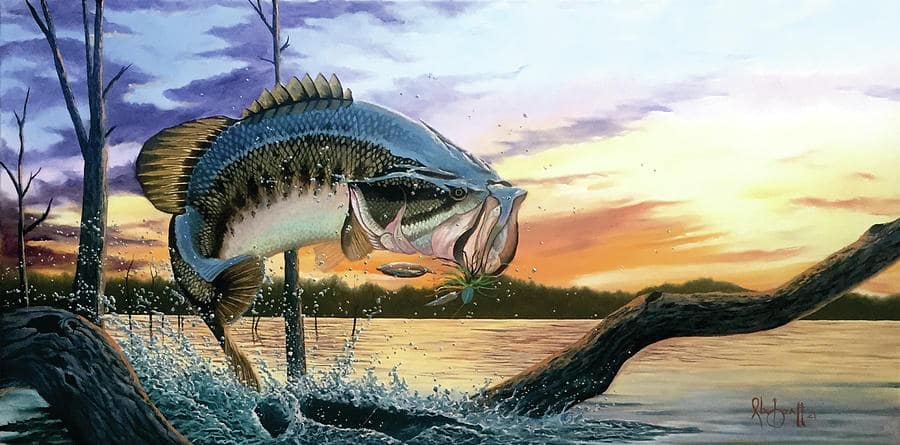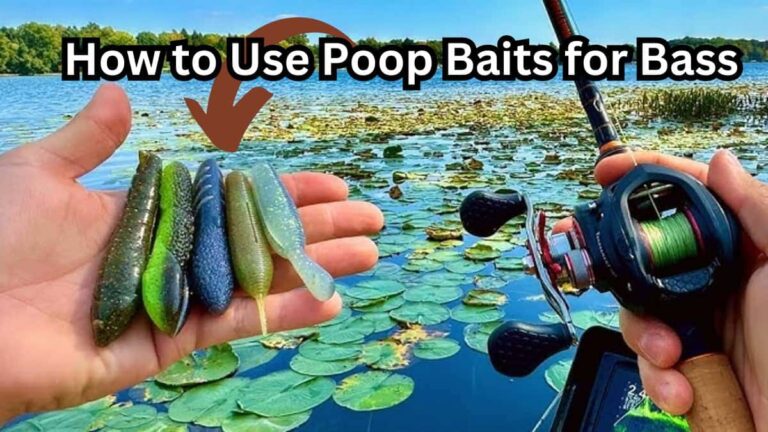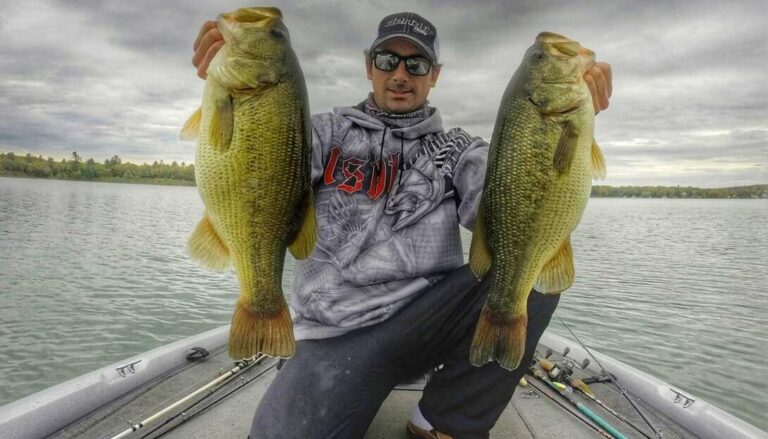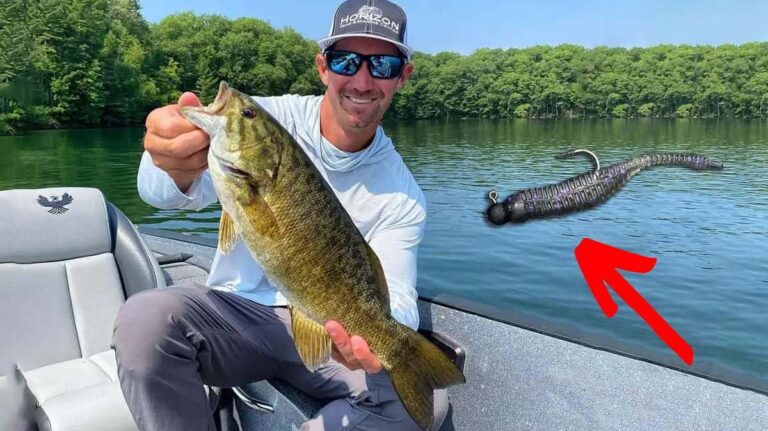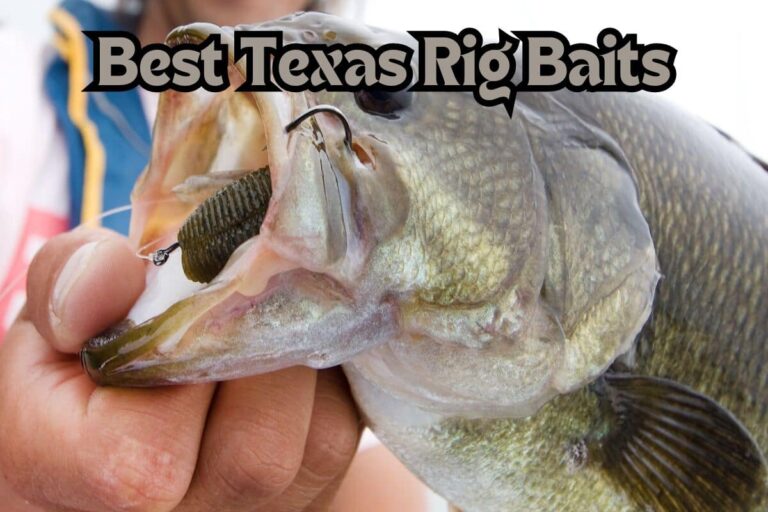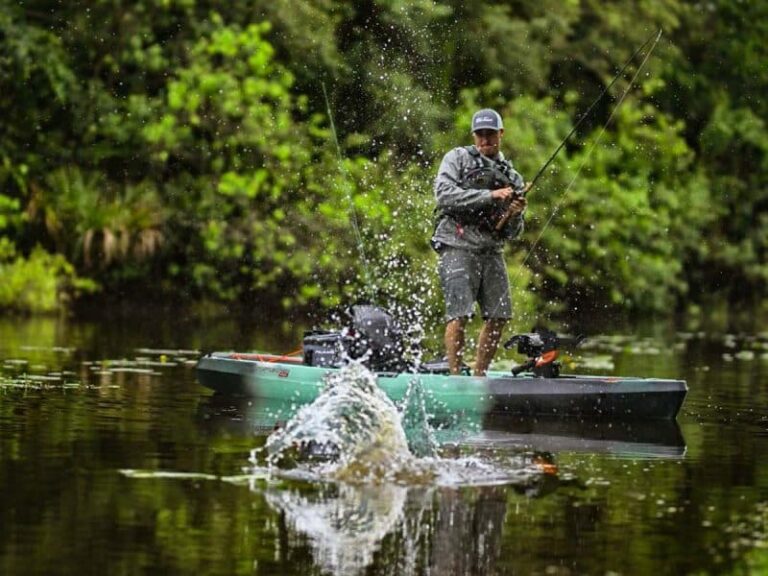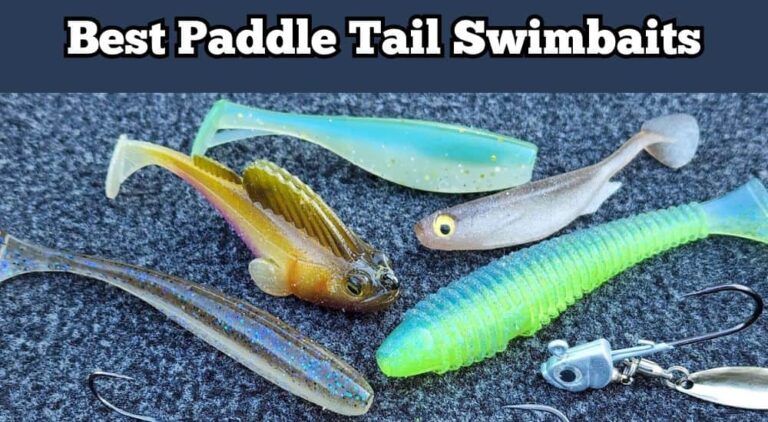Chatterbait Fishing: How to Fish a Chatterbait to Catch Big Bass
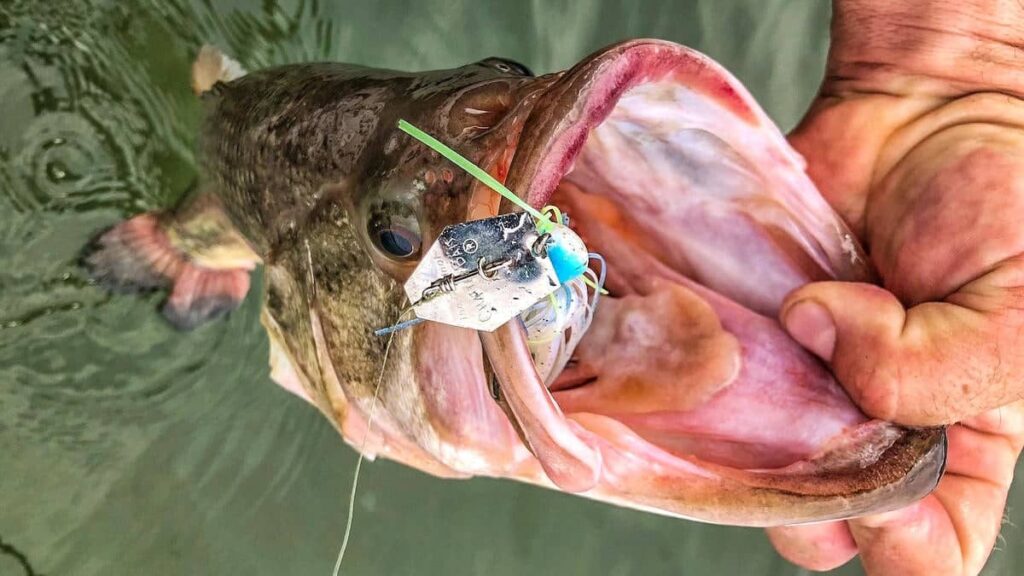
The chatterbait is a big bass magnet. During the past 5 years, chatterbaits have gained huge popularity amongst anglers.
No other lure feels like the chatterbait. The signature fast thump on the end of your rod tip makes you feel like you are about to get a huge bite.
After lots of chatterait fishing experience, I now know how to catch the most bass on these vibrating jigs.
What is a Chatterbait Lure?
Chatterbait, also known as a vibrating jig, is a unique fishing lure that combines the best features of a spinnerbait, a jig, and even a crankbait.
The blade gives off flash and vibration while the skirt adds bulk and visual appeal.
The Vibrating Jig Head
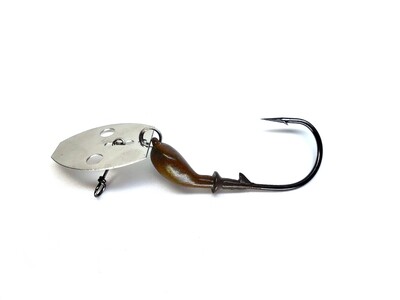
The vibrating jig head is the beating heart of the Chatterbait, and its significance lies in the unique action it imparts to this fishing lure.
Unlike traditional jig heads, the vibrating jig head is equipped with a metal blade, commonly referred to as the “chatter blade,” strategically positioned at the front of the lure.
The significance of the vibrating jig head lies in its ability to attract bass from a distance and in various water conditions.
The vibrations generated by the chatter blade create a sensory signal that can be felt by bass in their lateral lines, making it an excellent option for enticing fish even in murky or low-visibility waters.
Advantages of Chatterbait Fishing
- Efficient Search Bait: When you need to cover water quickly and locate bass, Chatterbait is the go-to option. Its vibrating action and enticing presentation help attract bass over larger areas.
- Natural Prey Imitation: The chatter blade’s constant vibration mimics the movements of injured or fleeing baitfish, triggering the predatory instincts of bass and enticing them to strike.
- Versatility in Skirt and Trailers: Chatterbait allows anglers to customize the skirt color and style, giving you the freedom to adapt to specific fishing conditions. Adding different trailers further enhances its appeal and action.
Chatterbait Setup
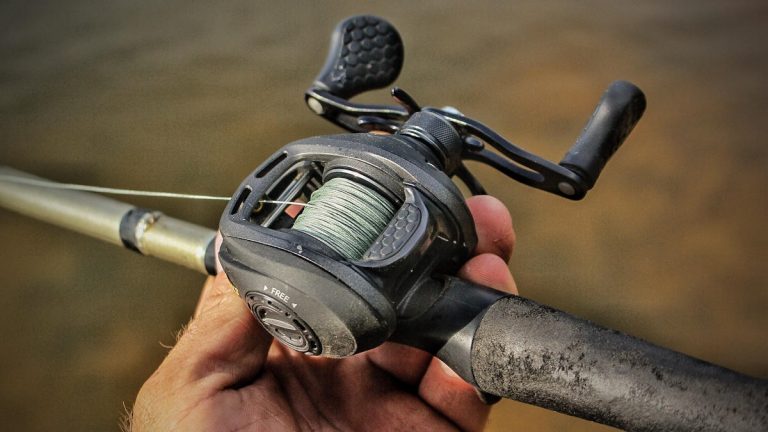
As with all lures, the proper rod and reel setup will help you maximize your chatterbait success.
Chatterbait Rod
Opt for a medium to medium-heavy power baitcasting rod, around 6’6″ to 7′ in length.
This rod strength provides the right balance of sensitivity and power to handle Chatterbait presentations and bass strikes.
Fishing Line
Use a braided fishing line in the range of 20 to 30-pound test. Braided line offers excellent sensitivity and strength, allowing you to detect subtle strikes and handle the potential challenges of bass fishing.
How to Fish a Chatterbait
- Perfect the Retrieve: Experiment with different retrieve techniques to find what works best. A steady retrieve is a reliable go-to, but try mixing it up with stop-and-go, yo-yo, or erratic retrieves to trigger more strikes.
- Vary Your Retrieval Speed: Sometimes bass prefer a slow presentation, while other times they like it fast and aggressive. Be adaptable and adjust your retrieval speed to match the bass’s mood.
- Pay Attention to Water Temperature: In colder water, slow down your retrieve and use a more subtle action. As the water warms up, increase the speed and aggressiveness of your presentation.
- Use Trailers to Your Advantage: Experiment with different trailer types and colors to fine-tune your Chatterbait’s action. A soft plastic swimbait or craw trailer can make a significant difference in enticing strikes.
Best Chatterbait Trailer
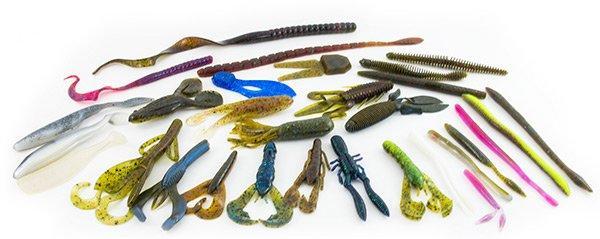
Paddle Tail Swimbaits
Swimbaits are a popular and versatile choice for Chatterbait trailers.
Their realistic swimming action closely imitates that of live baitfish, attracting the attention of bass in various water conditions.
Craw Baits
Craw trailers with their flapping claws and lifelike movements are excellent for mimicking crawfish, a favorite meal of bass.
They work wonders when fishing around rocky structures and other cover.
Grubs
Grub style trailers are simple yet effective. Their subtle tail action adds a touch of finesse to your Chatterbait presentation.
Grubs are actually my personal favorite trailer option.
Straight Tail Trailers
Straight tail trailers don’t have any action on their own. The most popular straight tail chatterbait trailers are flukes and split tail trailers.
These baits give less action and less resistance in the water. This allows you to fish them a bit deeper.
Also Read: Best Chatterbait Modifications
Key Points
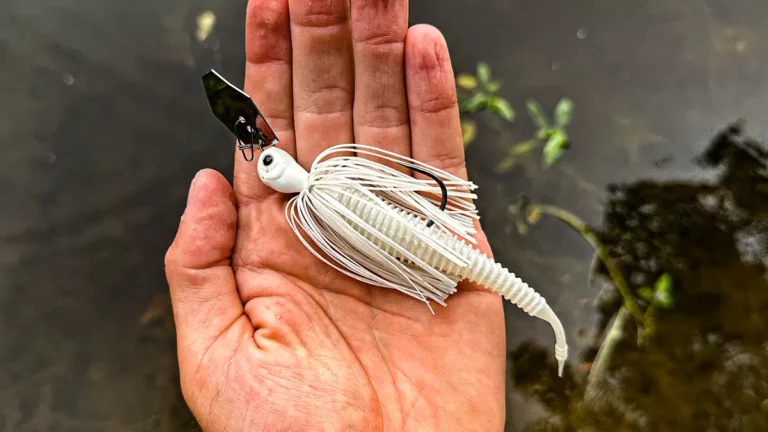
- Chatterbait Overview: Chatterbait, also known as a vibrating jig, has gained immense popularity among anglers in the last 5 years due to its unique combination of features from spinnerbaits, jigs, and crankbaits.
- Vibrating Jig Head: The vibrating jig head, equipped with the distinctive “chatter blade,” is crucial to the lure’s success. The vibrations generated attract bass from a distance, making it effective in various water conditions.
- Advantages of Chatterbait Fishing:
- Efficient Search Bait: Ideal for covering water quickly and locating bass over larger areas.
- Natural Prey Imitation: Mimics injured or fleeing baitfish, triggering bass’ predatory instincts.
- Versatility in Skirt and Trailers: Allows customization of skirt color and style, with the option to add different trailers for enhanced appeal.
- Chatterbait Setup: Optimal rod and reel setup include a medium to medium-heavy power baitcasting rod (6’6″ to 7′) and a braided fishing line (20 to 30-pound test) for sensitivity and strength.
- Fishing Techniques:
- Perfect the Retrieve: Experiment with different techniques like steady, stop-and-go, yo-yo, or erratic retrieves.
- Vary Retrieval Speed: Adapt to bass mood by adjusting retrieval speed – slow in colder water and faster as the water warms up.
- Use Trailers Strategically: Experiment with various trailer types and colors to fine-tune action and entice strikes.
- Best Chatterbait Trailers:
- Paddle Tail Swimbaits: Realistic swimming action imitates live baitfish.
- Craw Baits: Lifelike movements mimic crawfish, appealing around rocky structures.
- Grubs: Simple yet effective, adding finesse to Chatterbait presentation.
- Straight Tail Trailers: Flukes and split tail trailers offer less action, suitable for deeper fishing.
FAQ
Q1: What is a Chatterbait?
A1: Chatterbait, also known as a vibrating jig, combines features of spinnerbaits, jigs, and crankbaits, featuring a distinctive vibrating jig head.
Q2: Why is the Vibrating Jig Head Important?
A2: The vibrating jig head, equipped with the “chatter blade,” produces vibrations felt by bass in their lateral lines, attracting them from a distance, even in low-visibility waters.
Q3: What are the Advantages of Chatterbait Fishing?
A3: Chatterbait serves as an efficient search bait, mimicking natural prey movements, and providing versatility in skirt and trailer customization.
Q4: How Should I Set Up my Chatterbait?
A4: Optimal setup involves using a medium to medium-heavy power baitcasting rod (6’6″ to 7′) and a braided fishing line (20 to 30-pound test) for optimal sensitivity and power.
Q5: What Fishing Techniques Work Best with Chatterbait?
A5: Experiment with various retrieve techniques, vary retrieval speed based on water temperature, and strategically use trailers for maximum effectiveness.
Q6: What are the Best Chatterbait Trailers?
A6: Popular choices include Paddle Tail Swimbaits, Craw Baits, Grubs, and Straight Tail Trailers (flukes and split tail), each offering a unique action.
Q7: Why is Chatterbait Considered a Game-Changer in Bass Fishing?
A7: Chatterbait’s vibrating jig head, versatility, and ability to mimic injured prey make it a top-notch choice for anglers of all levels, ensuring an exciting and successful bass fishing experience.
Q8: When to Use a Chatterbait?
A8: Generally, chatterbaits work best in low light conditions such as overcast days, muddy water, and morning/evening hours.
Tying this Off
In conclusion, Chatterbait fishing for bass is an absolute game-changer! Its vibrating jig head, versatility, and ability to mimic injured prey make it a top-notch choice for every angler.
Whether you’re a beginner or a pro, Chatterbait is a reliable companion on your fishing adventures.
So, gear up, hit the water, and get ready for an exciting and successful bass fishing experience with the chatter of the Chatterbait leading the way.
